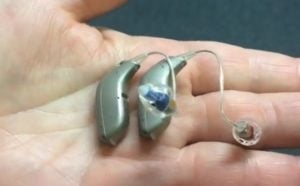Why do I need two hearing aids? It’s a frequently asked question that Managing Editor, Joy Victory of Healthy Hearing tackles in an article dated October 7, 2019. You can read the full article by clicking here.
 One hearing aid versus two:
One hearing aid versus two:
We almost always recommend two hearing aids if you have hearing loss in both years, because you will hear far better with two hearing aids instead of one. Your hearing care provider or audiologist will program each hearing aid separately, to match the precise levels of amplification you need in each ear (it’s normal to have different levels of hearing loss in each ear).
This is a well-known recommendation. For decades, research in the field of hearing science has supported the commonsense idea of wearing two hearing aids (with a few exceptions, which we discuss below). Here are a few convincing reasons to equip yourself with a pair of devices instead of just one:
Two hearing aids fully stimulate your brain:
You probably know one of the best ways to keep your body healthy and in good working order is to use it–that means getting regular exercise, taking the stairs instead of the elevator and getting your steps in for the day. Conversely, when we don’t move and use our muscles, they tend to weaken and can even atrophy over time.
Far better sound quality with two hearing aids:
One of the biggest reasons you may be considering getting hearing aids is that, besides not being able hear at normal levels, you find that even if you can hear speech, the sound isn’t clear. This may mean you have trouble understanding what others are saying, even in your good ear. This is especially true if there is background noise competing. Understanding speech is the foundation of good communication and there’s no better reason to seek hearing treatment.
Research has shown wearing two hearing aids makes for clearer conversation, making it possible to better understand sound. The study concluded a pronounced improvement in sound quality and clarity and higher speech discrimination test scores for subjects who had two hearing aids compared to those who wore hearing aids in only one ear.
You’ll better know where sound is coming from:
Knowing what direction a sound is coming from, or sound localization, is something people with normal hearing take for granted. From the time we are born and we learn to turn our head in the direction of our mother’s voice, we learn to perfect this skill. Not only is finding the source of sound helpful in everyday life, it can be an important safety consideration. Knowing where those ambulance sirens are in relation to your car helps you know when and where to pull over to allow emergency vehicles to pass.
Our two ears work in delicate harmony to make localization easy, and people who have single-sided deafness can attest to having difficulty with this skill. Dr. Francis Kuk writes in the Hearing Review that to improve localization, the first requirement is binaural cues from wearing two hearing aids.
When is one hearing aid better than two?
Some research indicates that for people with cognitive delays or dementia, one hearing aid may work better than two, even if a person has hearing loss in both ears. It’s thought that two hearing aids are over-stimulating for the brain and auditory pathways.
If you have normal hearing in one ear, and mild hearing loss in the other, you’re probably fine to just wear one hearing aid—just remember to get regular hearing tests to make sure your “good ear” is still hearing well.
If you have any difficulties hearing, please give us a call at 727-323-2471 and set up an appointment. We can help you.
Susan E. Terry, Au.D., F-AAA, F-NAP
Doctor of Audiology
Board Certified
P.S. We are here to help if you have any questions about your hearing, feel free to give us a call at 727-323-2471